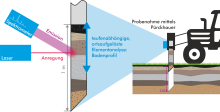Precision arable farming for sustainable agriculture - on-site analysis of arable soils (M.Sc. Saskia Stopp, Dr Thomas Vogt)
Evaluating soil fertility is necessary for every farmer. Determining the nutrient and humus content of arable soils is therefore routine for productive arable farming. Conventional homogeneous soil cultivation cannot achieve optimum yield potential because the land used for agriculture is highly heterogeneous. The established methods for determining soil composition involve time-consuming sampling and analysis in the laboratory. The development of analysis techniques that enable the required high sampling density and high spatial resolution with depth information (1 m) is a key challenge. The analysis techniques of infrared spectroscopy (IR) and laser-induced breakdown spectroscopy (LIBS) are highly efficient for the rapid assessment of soil composition in terms of nutrients, humus or water content. Element-specific emission lines appear in the LIBS spectrum to determine the total content of important nutrients.
Selected absorption bands in the mid and near infrared range can be used to identify binding forms of existing soil components and, using multivariate analysis methods, the soil type can be derived and contents (e.g. water content) quantified. In addition, both analysis methods generate spectra with a high information content, allowing the soil sample in question to be almost completely characterised with the aid of mathematical models. In order to validate the methods of the on-site analyses for highly variable soil compositions, all parameters are verified in parallel in the laboratory using classical or DIN methods and correlations are created for correction. The aim is to determine all relevant information in real time by combining the analysis techniques and using depth profiles taken directly on site and to make this data available to customers such as farmers, ministries or authorities.
Link to the start-up Quantus - Agriculture - Technologies GmbH: http://www.besser-landwirtschaften.de
